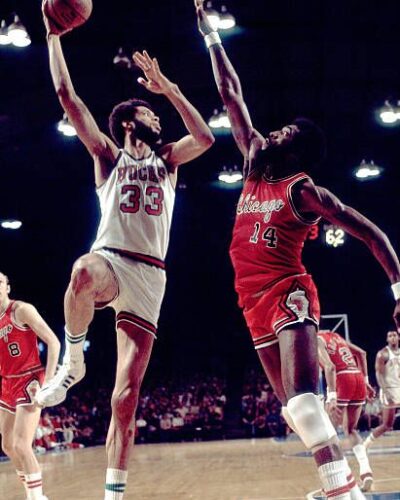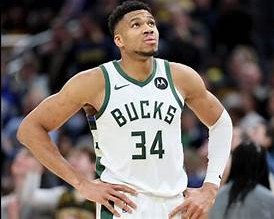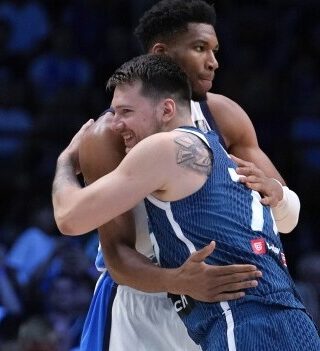Jokic is pursuing a rare third straight MVP award, but did you know Abdul-Jabbar almost won seven straight MVPs?
By GERY WOELFEL
Nikola Jokic of the Denver Nuggets appears on the precipice of accomplishing something that hasn’t been accomplished in nearly four decades and that’s being chosen the NBA’s Most Valuable Player for the third consecutive season.
The last player to win back-to-back-to-back MVP awards was the legendary Larry Bird, who earned the coveted award in 1994, ’95 and ’96.
Jokic, who could amazingly become the first big man in the history of the game to fashion a triple-double season for points, rebounds and assists and whose team is in first place in the Western Conference, could become just the fourth player to win the MVP award three straight seasons since the NBA first presented the award in 1956, the others being Wilt Chamberlain (1966-1968), Bill Russell (1961-1963) and Bird.
As you can see, winning three straight MVPs is a rarity. But one player could have won a mind-blowing seven – repeat, seven – straight MVPs.
And that was Kareem Abdul-Jabbar.
Abdul-Jabbar was clearly the most dominant player of the ‘70s, some people would argue of all time. In the 1970-71 season, just his second in the league and at the tender age of 23, Abdul-Jabbar won his first NBA MVP. He would go to capture the award four more times in the next six years.
In other words, from 1971 until 1977, Abdul-Jabbar wasn’t the MVP in just two seasons: 1972-73 and 1974-1975. A compelling argument could be made that he should have been the MVP in those seasons as well. To wit:
- In the 1972-73 season, the MVP award went to Dave Cowens of the Boston Celtics. The Celtics big man averaged 20.5 points, 16.2 rebounds and 4.1 assists
And Abdul-Jabbar?
In that same season, Abdul-Jabbar averaged 30.2 points, 16.1 rebounds and 5.0 assists. He wound up finishing second in the MVP voting.
- In the 1974-1975 season, the recipient of the MVP award was Buffalo Braves forward Bob McAdoo. He averaged 34.5 points, 14.1 rebounds and 2.2 assists. Clearly, MVP-caliber numbers.
And Abdul-Jabbar?
He averaged 30 points, 14 rebounds and 4.1 assists. His stats virtually mirrored McAdoo’s. Incredibly, Abdul-Jabbar finished fifth in the voting.
While Abdul-Jabbar didn’t collect seven straight MVP awards, he nevertheless finished his remarkable career with six MVPs, the most in league history.
By the numbers
The NBA and NBA Players Association are working on an agreement in which players would have to play a certain number of games to be eligible for major awards.
That wasn’t an issue for the league until recent years. Last season, Nikola Jokic missed eight games in his MVP run, and Milwaukee’s Giannis Antetokounmpo missed 10 games in each of his two MVP seasons in 2018-2019 and 2019-2920. Likewise, James Harden didn’t play in 10 games in his 2017-2018 MVP season.
That doesn’t seem like a lot of missed games. Yet, in the big picture of the league, it’s considerably more missed games than almost every other MVP in the history of the sport.
In fact, since Bob Pettit of the St. Louis Hawks won the first MVP in 1956, Antetokounmpo and Harden are among only four players to have missed double-digit games in their MVP seasons. The others were Philadelphia’s Allen Iverson (11 games missed) for the 2000-2001 season and Portland’s Bill Walton (24 games missed) for the 1977-1978 season.
With the exception of those four players, MVPs seldom missed games. That was especially true from the 1966-1967 season when Philadelphia’s Wilt Chamberlain earned MVP honors until the 1981-1982 season when Houston’s Moses Malone garnered the MVP award. In that span of 16 seasons, not one – zero, nada – MVP recipient ever missed more than one game.
Kareem Abdul-Jabbar won his record-setting six MVPs in that stretch. In four of those seasons, he played all 82 games. In the other two seasons, he played 81 games.
Consummate pros
While numerous MVPs have played every game of an 82-game regular-season schedule, four players once played in all 84 games … in the now defunct ABA. They were Julius Erving (three times), Billy Cunningham, Artis Gilmore and Spencer Haywood.




